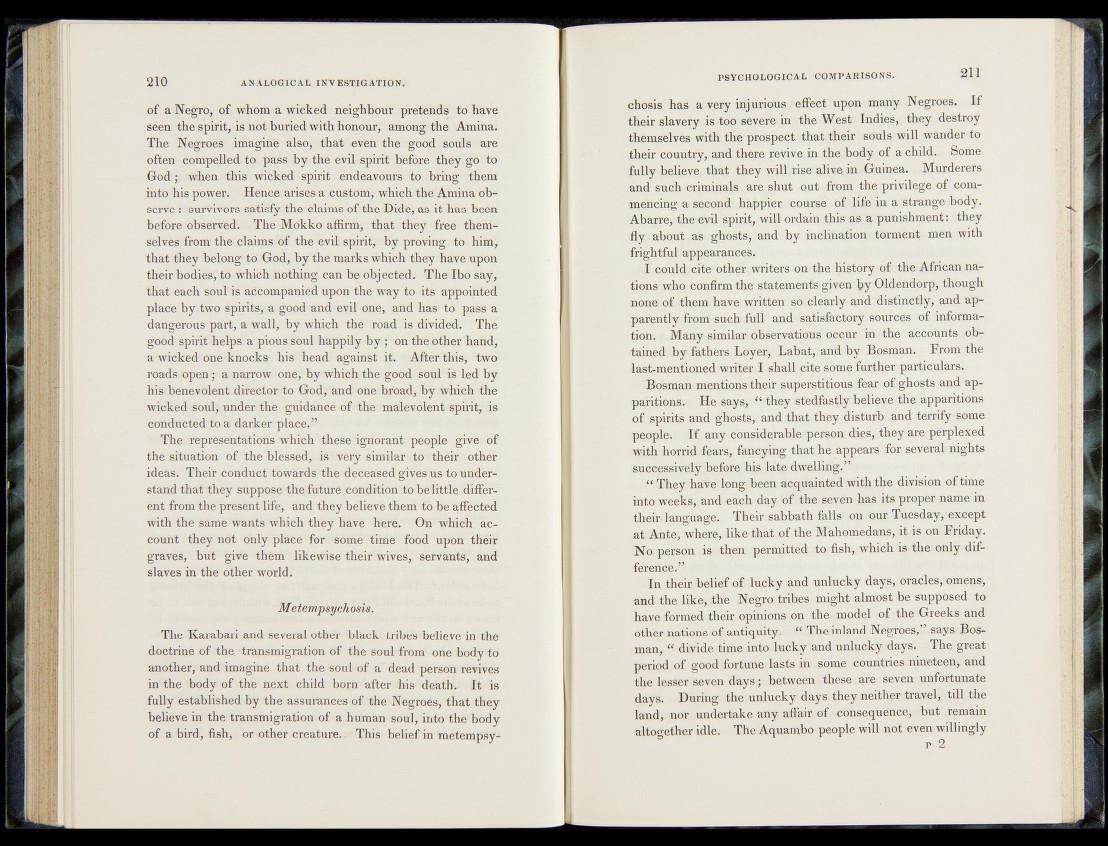
of a Negro, of whom a wicked neighbour pretends to have
seen the spirit, is not buried with honour, among the Amina;
The Negroes imagine also, that even the good souls are
often compelled to . pass by the evil spirit before they go to
G o d w h e n this wicked spirit endeavours to bring them
into his power. Hence arises a custom, which the"Amina db-*
serve: survivors satisfy the claims of the Dide, as it has been
before observed. The Mokko affirm, that they free themselves
from the claims of the evil spirit, by proving to him,
that they belong to God, by the marks which they have upon
their bodies, to which nothing can be objected. The Ibo sayy
that each soul is accompanied upon the way to its appointed
place by two spirits, a good and evil one, and has to pass a
dangerous part, a wall, by which the road is divided. The
good spirit helps a pious soul happily b y ; on the Other h and!
a wicked one knocks his head against it. After this, two
roads open ; a narrow one,= by which the good^sbul if Ml® by
his benevolent director to God, and one broad, by which the
wicked soul, under the guidance of the malevolent spirit, is
conducted to a darker place/’
The representations which these ignorant people- give of
the situation of the blessed, is very similar to their other
ideas. Their conduct towards the deceased gives us to understand
that they suppose the future condition to be little different
from the present life, and they believe them toi>e affected
with the same wants which they have here. On which account
they not only place for some time food upon theSr
graves, but give them likewise their wives, servants, and
slaves in the other world.
Metempsychosis.
The Karabari and several other black tribes believe in the
doctrine of the transmigration of the soul from one body to
another, and imagine th a t the soul of a dead person revives
in the body of the next child born after his death. I t is
fully established by the assurances of the Negroes, that they
believe in the transmigration of a human soul, into the body
of a bird, fish, or other creature. * This belief in metempSy-4
.chosis has a very injurious effect upon many Negroes. If
their slavery is too severe in the West Indies, they destroy
themselves with the prospect that their souls will wander to
their country, and there revive in the body of a child. Some
fully, believe-: that they will rise alive in Guinea. Murderers
and such criminals are shut out from the privilege of commencing
a second happier course of life in a strange body.
Abarre, the evib spirit, -will ordain this as- a punishment: they
fly about as' ghosts,:and by inclination torment men with
frightful appearances.
I could cite other writers on' the ‘history «of the-African na-
tions-whx) confirm the statements given-by Oldendorp, though
none of them have written^© clearly d^d*distinctly, and apparently
from such full and Satisfactory sources of information.
Many similar observations occur in the accounts obtained
byjththers' Layer, Labat, and by Bosman, f From the
last-mentioned writer I shall cite some further particulars.
Bosman mentions their superstitious fear of ghosts and apparitions.,
He says, “ they stedfastly believe the apparitions
of spirits and-ghostS, and that they disturb .and terrify some
people; I f any considerable person dies, they are perplexed
with horrid fears, fancying that he appears >for> several; nights
suceessiv&ly‘bef©re Ms late dwelling/ ’ 4
, . “ They have long beett~doquainted with the division of time
into weeks,j andTea'ch day. of - the;seven has its proper name in
their-language; Their sabbath falls -on our Tuesday, except
at Ante, where, like tliateof the Mahomedans, it.is-on Friday.
No person is then permitted to fish, which>sis the only difference.”
■
In their belief of lucky and unlucky days,! oraclffejtomens,
and the like, the Negro tribes might almost be supposed to
have formed their opinions on th e model of the Greeks and
other nations of antiquity.: “ The inland Negroes,” says Bosnian,
“ divide time into lucky and unlucky days. ^The great
period of good fortune lasts in some countries nineteen, and
the lesser seven days-; , between these are seven unfortunate
days. During the unlucky days they, neither travel, till the
land, nor undertake any affair of consequence,: b u t remain
altogether idle. The Aquambo people will not even willingly